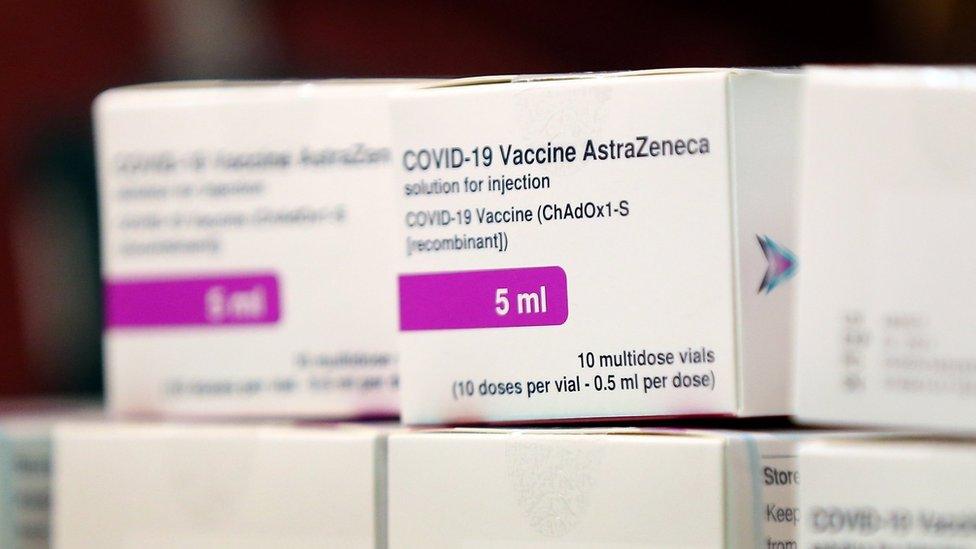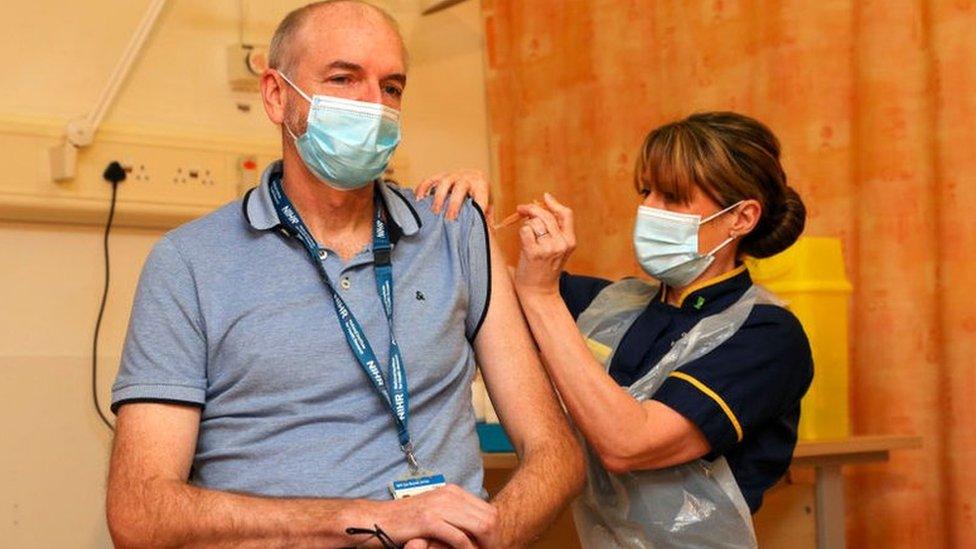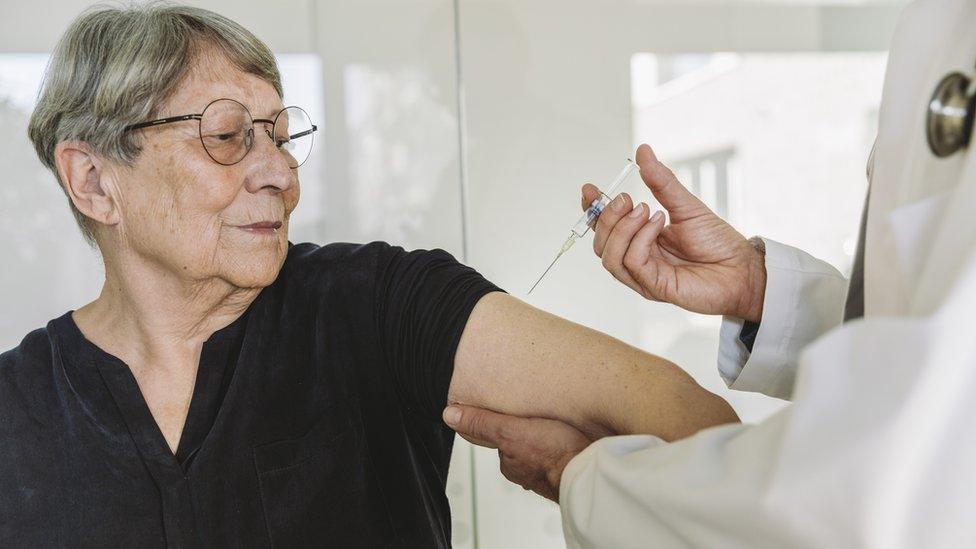Covid-19: Vaccine rollout widens as hospital pressure rises
- Published
- comments

GPs in England are receiving doses of the Oxford Covid jab as medics warn about overstretched hospitals.
The rollout of the Oxford vaccine is part of the NHS's biggest-ever effort and aims to offer jabs to 13 million by mid-February - including all over-80s.
But Health Secretary Matt Hancock admitted vaccine supply was a "rate-limiting" factor.
Birmingham's NHS said there are enough supplies with more to come as politicians warned doses may run out.
Some hospitals in England are at risk of becoming Covid-only sites, with rising admissions for the virus forcing trusts to cut back on other services.
And hospital leaders have warned medics are becoming increasingly stretched with "untrained staff" used to fill gaps.
It came as a further 1,162 deaths within 28 days of a positive test were reported on Thursday - the second consecutive day of more than 1,000 recorded fatalities - and 52,618 new cases.
The latest NHS statistics also show that there were 30,370 patients with Covid in UK hospitals on Tuesday.
The rollout of the Oxford vaccine to GPs will help increase vaccinations among the top four priority groups who are first in line to receive doses.
The Department of Health said 1.3 million people in the UK, including almost a quarter of those aged over 80 in England, have received at least one dose so far.
Writing to Health Secretary Matt Hancock, the Birmingham political leaders criticised communication around the vaccination programme in the city.
"We acknowledge that the vaccination rollout is in its early days, but we have also learned today that Birmingham has not yet been supplied with any AstraZeneca stock, while current Pfizer stocks are scheduled to run out on Friday this week with currently no clarity on when further supplies will arrive."
They added "it remains unclear who is responsible for overseeing the vaccination programme in Birmingham, and whom we should hold accountable for progress and delivery".
The letter is signed by Labour leader of Birmingham City Council, Ian Ward; Liam Byrne MP, Labour's candidate for the West Midlands mayor, and by Conservative MP and ex-minister Andrew Mitchell.
Allow X content?
This article contains content provided by X. We ask for your permission before anything is loaded, as they may be using cookies and other technologies. You may want to read X’s cookie policy, external and privacy policy, external before accepting. To view this content choose ‘accept and continue’.
But NHS Birmingham and Solihull told the BBC: "Thousands of people in Birmingham and Solihull have already been vaccinated and this continues at pace.
"We have sufficient supplies and more will be coming."
West Midlands mayor Andy Street said he has been assured supplies of the Oxford vaccine will be delivered to Birmingham on Friday.
Elsewhere, Gillian McLauchlan, deputy director of public health at Salford Council, described "teething" issues with the vaccine rollout there.
She told councillors at a local scrutiny committee: "We have no control over vaccine supplies. We are told literally two days in advance 'your next lot of vaccines are coming'."
England's vaccination programme is described as the biggest in NHS history, with an aim to offer jabs to most care home residents by the end of January and the most vulnerable by mid-February.


Officials leading the vaccination programme are adamant rollout is going to plan - and are cautioning against judging performance too early.
Of course, there will be teething problems, but the fact remains the UK has vaccinated more per head of population than any other country apart from Israel and Bahrain.
While rollout of the Oxford-AstraZeneca vaccine started on Monday, it was actually only being used at the hospital hubs up to Thursday.
Deliveries are now being made to hundreds of local vaccination centres. There are 17 in the Birmingham region so they should start to receive doses imminently.
That should mean there is a vaccine available if they do run out of the Pfizer-BioNTech jab.
Although disruption to the rollout of the programme in the city may still happen as local centres are warning they cannot book patients in until they know they have stock available.
But the fact the city's leaders felt compelled to write to the health secretary to warn about this is an illustration of the pressure in the system at the moment.
Given the high level of infections and current lockdown, there is a desperation in all quarters to get the most at-risk vaccinated as quickly as possible.
And until the nation sees that translate into significant numbers of people getting vaccinated - 2 million a week is the goal - people will remain on edge.

The Pfizer-BioNTech vaccine was approved for emergency use on 2 December but requires specialist storage unsuitable for most GP practices, with doses largely delivered in hospitals.
The Oxford-AstraZeneca jab was approved on 30 December and does not require specialist storage. It was first rolled out on Monday to hospitals and to GPs in England from Thursday.
One medical centre in London is now vaccinating almost 1,000 people a week
Mr Hancock visited a GP surgery in London to promote the roll out earlier - but staff there said delivery of the Oxford vaccine had been delayed.
The health secretary said he was "delighted" care home residents would begin receiving their first Oxford jabs from GPs this week.
"This will ensure the most vulnerable are protected and will save tens of thousands of lives," he said.
GP Ammara Hughes, a partner at Bloomsbury Surgery, told broadcasters its first delivery of the Oxford jab had been pushed back 24 hours to Thursday.
She said: "It's just more frustrating than a concern because we've got the capacity to vaccinate. And if we had a regular supply - we do have the capacity to vaccinate three to four thousand patients a week."
Mr Hancock described supply of vaccine as a "rate-limiting" step.
He said: "For the first three days with the Oxford vaccine we did it in hospitals to check that it was working well and it's working well so now we can make sure that it gets to all those GP surgeries that like this one can do all the vaccinations that are needed.
"The rate-limiting step is the supply of vaccine. We're working with the companies - both Pfizer and AstraZeneca - to increase the supply."

More than 700 local vaccination sites will administer jabs, with the government announcing a further seven mass vaccination sites across England.
Another 180 GP-led sites, 100 new hospital sites and a pilot scheme involving local pharmacies will open this week.
Meanwhile, nearly 19,981 second doses of the Pfizer/BioNTech jab - which was the first to be approved for emergency use in the UK last month - were administered between 29 December and 3 January, NHS England said.
It came as Rupert Pearse, professor of intensive care medicine and a consultant at the Royal London, said his own intensive care staff are having to care for far more sick patients.
He told BBC Radio 4's Today programme there would usually be a ratio of one fully-trained intensive care nurse for each patient in a unit but staff are becoming increasingly stretched.
"Right now we are diluting down to one [intensive care] nurse to three [patients] and filling those gaps with untrained staff and in some instances doctors helping nurses deliver their care... and we're even facing diluting that further to one in four," he said.
All of the UK is now under strict virus curbs, with Wales, Northern Ireland and most of Scotland also in lockdown, and vaccinations are progressing across the devolved nations.
- Published7 January 2021

- Published6 January 2021

- Published2 December 2020
